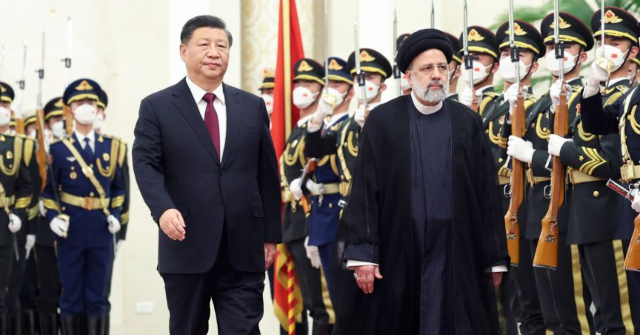China hosted the defense ministers of Russia and Iran — alongside Belarus, Pakistan, and Kyrgyzstan — on Wednesday for a meeting on global security in the aftermath of the most destructive military engagement against Tehran in recent memory.
The meeting, China’s state-run Global Times reported, was led by Chinese Defense Minister Dong Jun and took place in the greater context of the Shanghai Cooperation Organization (SCO), a central and south Asian defense coalition led by China. While Chinese state media insists that the SCO is not an “alliance” — meaning that no treaty obligation exists among countries to defend each other in the event of an attack — the SCO functions in practice as an attempt to curb the global influence of the North Atlantic Treaty Organization (NATO), the dominant Western military alliance.
The SCO is hosting its defense ministers for a summit on Wednesday and Thursday. In addition to the countries partaking in the meeting on Wednesday, Indian Defense Minister Rajnath Singh was among the big names attending the larger event. India, Russia, China, and Iran are all members of the BRICS economic and security coalition — another attempted counterweight to American global influence — which is expected to hold its annual summit in Brazil in early July.
Speaking at the meeting, Dong warned that the so-called multilateral forces led by China were facing significant challenges internationally, an apparent reference to the return to the White House of President Donald Trump and the more assertive stance the United States has taken on foreign policy since then. The Global Times paraphrased Dong as saying that “profound changes unseen in a century are rapidly unfolding, unilateralism and protectionism are on the rise, while acts of hegemony, overbearing, and bullying are severely undermining international order, becoming the primary source of instability and chaos.”
Dong declared that SCO countries must “unite more progressive forces with shared ideals, uphold international fairness and justice and safeguard global strategic stability.”
“As momentous changes of the century accelerate, unilateralism and protectionism are on the rise,” Turkey’s Hurriyet newspaper, quoting the Chinese state outlet Xinhua, quoted Dong as saying. “Hegemonic, domineering, and bullying acts severely undermine the international order.”
Aziz Nasirzadeh, the Iranian defense minister, took the opportunity to address Iran’s current conflict, describing the world’s foremost sponsor of terrorism as a victim that “recently came under attack.”
“He hopes that China will continue to uphold justice and play an even greater role in maintaining the current ceasefire and easing regional tensions,” the Global Times relayed.
In addition to attending the meeting on Wednesday, Iran’s Tasnim News Agency reported on Thursday that Nasirzadeh is expected to attend bilateral meetings with top Chinese officials “to discuss bilateral and regional developments.” Tasnim indicated that China and Iran are both looking for “enhanced military cooperation” with each other — a potential angle for China’s military to elevate its relevance in the Middle East.
Most members of the SCO are not engaging in or threatened with routine military action outside of occasional border scuffles between China and India. Iran, which joined in 2022, is the glaring exception. The Iranian Islamic regime regularly calls for “death to Israel” and “death to America,” particularly threatening to destroy the neighboring Jewish state. Following a United Nations condemnation of Iran’s illicit nuclear program on June 12, the Israeli government launched a military operation to eliminate Iran’s most dangerous military leaders and degrade its missile launching capabilities.
President Donald Trump announced on Saturday that the United States had joined the operation and conducted massive airstrikes against three Iranian nuclear sites — Natanz, Isfahan, and Fordow — reportedly dramatically reducing Iran’s ability to enrich uranium.
The conflict ended with a ceasefire declaration on Monday, which has held at press time. Throughout the conflict, Chinese and Russian officials repeatedly made efforts to take on a prominent role in mediating. Iranian officials demanded international support, but did not accept offers for China or Russia to intervene.
“The international community must take a stand, because it is not just Iran that is being threatened, it’s the very foundations of international law that are being challenged,” Iranian Foreign Minister Abbas Araghchi declared on Sunday. “The response to these statements should not come from Iran alone.”
Neither China nor Russia offered military support for Iran — Russian strongman Vladimir Putin explicitly rejected the idea, citing the high number of Russian speakers in Israel. He did welcome Araghchi to Moscow, but the talks there on Monday did not appear to result in any significant Russian role in the conflict.
President Trump revealed on Wednesday that Putin also called him seeking a mediating role for Russia with Iran, which Trump declined.
“As you know, Vladimir called me up. He said, can I help you with Iran?” Trump narrated to reporters. “I said, ‘No, I don’t need help with Iran. I need help with you!’”
The Iran-Israel conflict will likely surface as a significant issue in the upcoming BRICS summit hosted by Rio de Janeiro, Brazil, and scheduled for July 6 and 7. Reports indicate that Chinese dictator Xi Jinping is not expected to attend — his first-ever absence at a high-level BRICS meeting — after failing to establish a role for Beijing in the Middle East situation.
Follow Frances Martel on Facebook and Twitter.
Read the full article here


